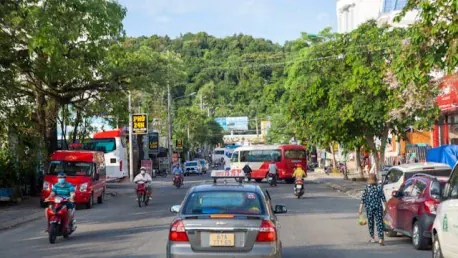The Trans Metro Dewata (TMD), an integrated highway bus system in Bali, has officially ceased operations as of January 1, 2025. The news was first announced through an Instagram post by @transmetrodewata, marking the end of a service that had provided transportation across six corridors in the Denpasar, Badung, Gianyar, and Tabanan areas since its inception on September 7, 2020. The shutdown comes as a significant blow to the local community, prompting widespread concern and discussions on the future of public transportation in Bali.
Lack of Subsidy Support
Absence of Subsidies in the 2025 State Budget
The primary reason behind the cessation of TMD’s operations is due to the lack of continued subsidy support from the Indonesian Ministry of Transportation. I Gusti Wayan Samsi Gunarta, the Head of the Bali Provincial Transportation Agency, confirmed that the 2025 State Budget (APBN) did not allocate funds for TMD bus operations. The absence of these critical subsidies has made it impossible to sustain the bus system, forcing the service to halt its operations after more than four years of serving the public.
In an effort to address this shortfall, the provincial government of Bali and the Ministry of Transportation have entered into negotiations to secure interim funding. These discussions aim to find a temporary solution that would allow the provincial government to eventually take over full operations of the bus service. Until a resolution is achieved, however, the lack of subsidies casts a shadow over the continuity of affordable public transportation options for Bali’s residents.
Provisional Measures and Financial Implications
The provincial government of Bali has attempted to cushion the blow by allocating budgetary provisions for one corridor’s service in the 2025 regional budget (APBD). Nevertheless, transitioning the entire system over to provincial government control will require not only time but also substantial financial investment. An estimated annual budget of around IDR 80 billion is necessary to cover various operational and management components, reflecting the formidable fiscal challenges ahead.
Netizens and regular users of the TMD have expressed their dissatisfaction and concern over the cessation of operations, underscoring how vital the bus system was for the lower middle class. For many, the TMD served as an essential mode of transportation, and its absence could disproportionately affect those who depend on it the most. Moreover, the end of TMD could lead to increased traffic congestion in Bali, exacerbating existing transportation issues and hindering efforts to promote sustainable and environmentally friendly public transportation solutions.
Community Response and Future Planning
Public Disappointment and Traffic Concerns
The reaction from the public towards the stoppage of TMD operations has been notably negative. Many users of the service have taken to social media to voice their disappointment, pointing out that the bus system was a critical lifeline for the lower middle class. The potential ramifications of the lost service include an increase in traffic congestion, as those who relied on TMD buses may now be compelled to use private vehicles or other less sustainable transportation options.
Aside from congestion issues, the community has also raised concerns about the broader implications for sustainable and environmentally friendly public transportation. The absence of an efficient and accessible mass transit system could derail efforts to reduce carbon footprints and promote eco-friendly practices in Bali. Hence, the cessation of TMD has not only economic but also environmental and social consequences that need addressing through comprehensive and strategic planning.
Future Negotiations and Gradual Transition
In response to the situation, the provincial government of Bali is actively working with the Ministry of Transportation to negotiate continued funding, with the goal of ensuring there is no long-term disruption in public transportation services. These negotiations are crucial for the provincial government to prepare to assume full operational control of the bus system. Despite the complexity of the issues involved, both parties seem committed to finding a viable solution that will meet the community’s transportation needs.
Moving forward, the necessary steps will include securing interim funding, planning for the long-term financial viability of the bus service, and ensuring a smooth transition of management responsibilities. This phased approach is essential to mitigate any immediate adverse effects on local residents and to build a sustainable model for public transportation in Bali. The end of TMD operations marks a challenging period, but with coordinated efforts and strategic planning, there is hope that an improved and resilient system can be established.
The Path Ahead
Strategic Planning for Sustainable Solutions
One of the key steps in addressing the cessation of TMD operations is strategic planning. This involves not only financial allocation but also identifying how to manage the bus system effectively under provincial control. The focus is on creating a sustainable transportation model that aligns with both economic realities and environmental goals. This ensures that Bali can continue to offer reliable public transportation to its residents while promoting eco-friendly policies.
Collaborative Efforts for Better Outcomes
The Trans Metro Dewata (TMD), an integrated highway bus system that served Bali, officially ended its operations on January 1, 2025. This closure was first announced via an Instagram post by @transmetrodewata, signaling the end of a service that had been providing transportation across six key corridors in the Denpasar, Badung, Gianyar, and Tabanan areas. TMD began operations on September 7, 2020, as a crucial part of Bali’s public transportation network. The news of its shutdown has been a significant blow to the local community, igniting widespread concern and discussions about the future of public transportation in the region. Residents relied heavily on TMD for daily commuting, and its termination has left many wondering how they will navigate the island in the absence of this service. Local authorities are now faced with the challenge of developing alternative transportation solutions to fill the void left by TMD’s departure.









